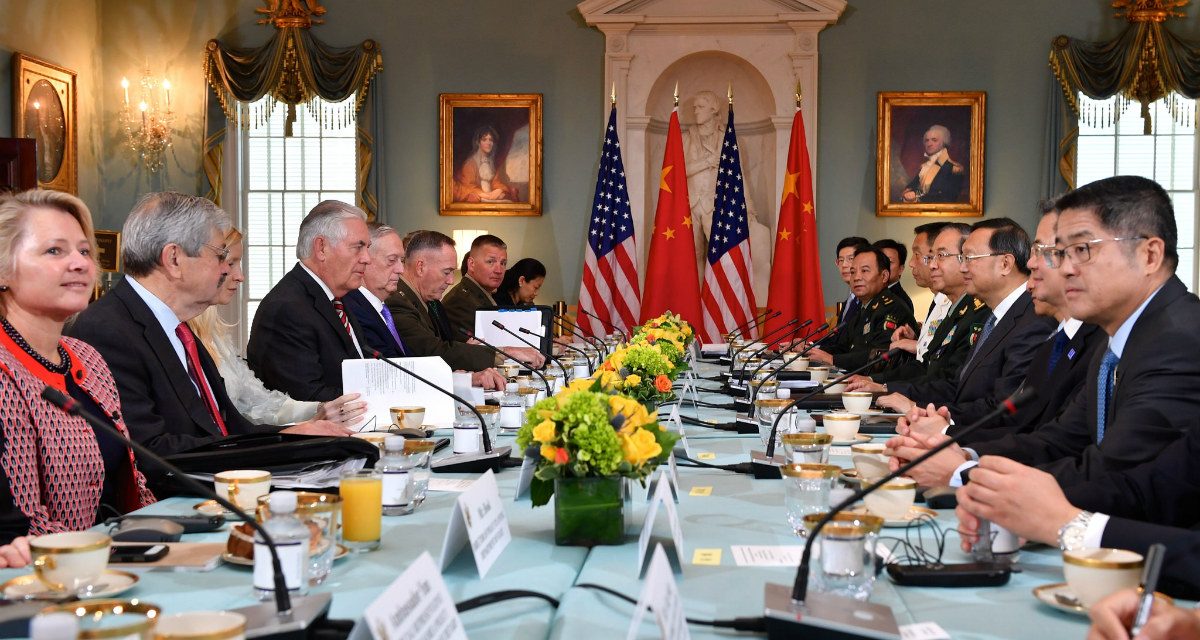Graham Allison, Destined for War: Can America and China Escape Thucydides’s Trap? (Houghton Mifflin Harcourt, 2017)
In his recent tome, Graham Allison warns that the United States and China are trapped in what he terms “Thucydides’s Trap,” otherwise known as the security dilemma. Reviewing cases from the Peloponnesian War to the Anglo-German rivalry, Allison mines history for lessons on managing great power rivalry and preventing the outbreak of conflict. The end product is a book rich in scope and even magisterial in its execution. Unfortunately, Allison’s fundamental argument is also problematic: in its total emphasis on the security dilemma, it fails to recognize the important role status is playing in shaping Sino-American relations that Allison understates.
The security dilemma has long been debated among international relations theorists. As a theory, its development was influenced by the experience of Athens and Sparta—Thucydides wrote of the Peloponnesian War that “it was the rise of Athens and the fear this instilled in Sparta that made war inevitable”—and arms racing during the Cold War. The security dilemma suggests that increases in one state’s security—even a defensively motivated power—may decrease the security of another power. (Or, as Charles Glaser put it, moves to reassure one power make the other less secure.) States are fundamentally uncertain over one another’s present and future intentions. However, the theory continues, this does not mean states are doomed to fight. The offense-defense balance of military technology allows states to break out of the security dilemma. This depends upon (1) the relative advantages of offense versus defense, and (2) the degree to which offense and defense can be differentiated from one another. A simple, intuitively plausible device to explain conflict, the security dilemma has had plenty of criticisms leveled at it.
First, some such as Randall Schweller question the very existence of the security dilemma. Conflict emerges as a result of certainty, not uncertainty. Concepts like the security dilemma assume that all states are security-seekers when, in fact, they are not. States have ambitions beyond security, such as status and hegemony. Remember Kaiser Wilhelm II’s weltpolitik and desire for Germany to have a “place in the sun.” Second, measurement issues bedevil the offense-defense balance, with proponents failing to come to a consensus on what constitutes an offensive weapon and what constitutes a defensive one. Furthermore, evidence that states take the offense-defense balance into account when sending and receiving signals is scant. Given such charges of the theory’s weakness, Thucydides’ Trap is hardly the best lens for examining the present and future of Sino-American relations, and yet that’s precisely Allison’s book does.
Allison assumes that the Sino-American balance of power will follow a typical power transition. This means the status quo power (the United States) will continue to decline and the rising challenger (China) will continue to rise. The trick for policymakers is to determine how to strike a peaceful bargain between the two states: getting the United States to avoid waging a preventive war out of fear it will be attacked after the transition occurs, and convincing China to avoid attacking before a power transition is complete in order to claim great power status.
There are two problems with this line of thinking. First, we could see a reverse power transition. This characterized the end of the Cold War, when the dominant United States’ relative power continued to increase as the Soviet Union dug itself deeper into decline. A severe recession or depression could knock an ambitious Beijing back on its heels and force President Xi Jinping or a successor to focus on domestic rather than international issues. Second, several international relations theorists have called into question the inevitability of a power transition, noting that while China is rising, it is unlikely to surpass the United States in the near future.
Donald Kagan wrote, “Thucydides found that people go to war out of ‘honor, fear, and interest.’” Despite the length of Allison’s book, its overwhelming emphasis is placed on just one of these three drivers: fear. Insufficient space and attention is paid to great powers’ search for honor or status. In the case of China, the omission of status is particularly important. Status, as one scholar has defined it, is “an attribute of an individual or social role often related to rank.” China’s search for status has been a consistent theme among scholars who study Beijing’s foreign policy. For example, it has been argued that China’s pursuit of naval power has more to do with “keeping up with the Joneses’” than naval security, per se.
Of course, deft diplomacy is still needed because China has the capacity to pose “problems without catching up.” Thus, some of the potential dangers Allison points to, such as the risk of accidental war and inadvertent escalation, remain. However, it is highly unlikely that we are en route to a hegemonic war.
Managing the rise of China is likely to be the greatest challenge for American foreign policy in the next quarter century. Allison’s book sheds light on the need for the adept management of a rising, ambitious state. However, the theoretical underpinnings of Thucydides’s Trap are problematic. Given the calamitous consequences of a rivalry or war between the United States and China, an assessment of the relationship between Washington and Beijing should not be limited to security dilemma theory.



I think the author of the article did not really read the book. Allison specifically identified factors for long-term competition between China and the U.S and acute factors for accidental war. Factors for the long-term competition are cultural, political and economic conflicts; factors for accidental war are North Korea, South China Sea, and Taiwan. Thucydides' Trap is a much more nuanced theory then Security Dilemma, which normally describes countries that lack communications with each other. It takes a series of gradations between Thucydides' Trap and Security Dilemma, former describes an early form of competition between the rising power and the dominant power, and if such competitive pressure continues to escalate, it will increase the possibility for war between the two, therefore transition to a more severe form of competition, maybe resulted in arm race, pose Security Dilemma on both parties, last if the trend is not being stopped, then war.
I agree with this critique. Nations are more complex and with more diverse motives than the theory suggests, though I have not read this book. The reasons I do not believe that China and the US will go to war are:
1. People assume that they are rivals. What if the reality is that USA has "created" modern China as part of a global economy? Some would say this was very unwise as they have created their own enemy. I don't see it that way. Powerful countries can work together, they don't have to be rivals. The Chinese are becoming less Chinese and more American every day. China is more likely to go to war with Asia this century, not America.
2. The China USA relation, their co-prosperity, is dependent on their mutual agreements and cooperation. Neither party will endanger this relationship which they have built over decades. They would lose more than they could gain.
I think that this "rivalry" is destined to remain an economic rivalry for the near future as China cannot project military power outside of two main regions. What has been exposed by Trump taking the war to the enemy is the inherent weakness of fiat currency and the real albatross of debt in that equation. We saw two superpowers going to have an economic conflict but it was more paper than real in the last 3 years.
Trump will fall over backwards to talk about new trade deals to try to influence those that don't see the inherent weaknesses of both economies, it makes the stock market rise, while killing the ability of the bond market to indeed sustain the debt in any serious way. China's own inherent weakness for an overstretched yuan with its own debt albatross limits its ability to do anything either. This would definitely seem to only exacerbate the need for a war to project the health of the state. Neither of these powers has the real strength globally to sustain a conflict of any scale like the Peloponnesian War as most GDP is sucked up in domestic agenda and priorities on both sides.
Who decides? Pearl Harbor gave the U.S. PEOPLE a strong motive of vengeance against shame, but FDR was conducting an elite game plan at a different level.
Some comments have not aged well.